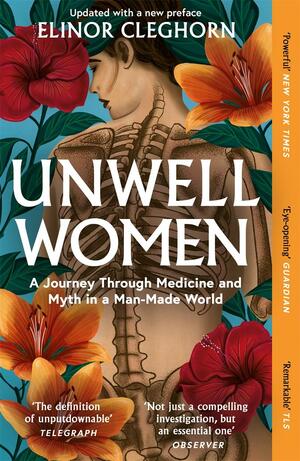
Unwell Women: A Journey Through Medicine and Myth in a Man-Made World
by Elinor Cleghorn
Genres: History, Non-fiction, SciencePages: 512
Rating:

Synopsis:Medicine carries the burden of its own troubling history. Over centuries, women's bodies have been demonised and demeaned until we feared them, felt ashamed of them, were humiliated by them. But as doctors, researchers, campaigners and most of all as patients, women have continuously challenged medical orthodoxy. Medicine's history has always been, and is still being, rewritten by women's resistance, strength and incredible courage.
In this ground-breaking history Elinor Cleghorn unpacks the roots of the perpetual misunderstanding, mystification and misdiagnosis of women's bodies, illness and pain. From the 'wandering womb' of ancient Greece to today's shifting understanding of hormones, menstruation and menopause, Unwell Women is the revolutionary story of women who have suffered, challenged and rewritten medical misogyny. Drawing on Elinor's own experience as an unwell woman, this is a powerful and timely exposé of the medical world and woman's place within it.
The health of female-bodied people has long been a thorny problem. Those in charge of medicine and health have so often been men, and the “default” or “correct” body has been thought to be male. I’m not just talking about in Victorian times or something — in modern times, medication has often only been tested on men, because women are inherently too variable and would throw off the results. (This makes a certain sense when you think about good experimental design, until you remember that the medication is supposed to work for women too, and will be given to them without further testing, so we really should actually know about the effects of the hormone cycle on it.)
Elinor Cleghorn’s book aims to discuss that history, to discuss the whys and wherefores and the impacts on women, not just now, but in the past, and not as something that’s necessarily getting better, but as something which still affects women now — including herself. It’s not just that women’s bodies are considered strange and different, but the experiences of female-bodied people about their own bodies haven’t been believed, and they haven’t been trusted to have any insight or understanding.
Obviously this book is a hard read in that way, chronicling a lot of mishaps and a lot of misogyny, some of it completely institutionalised. But it’s a useful one, if you want to take a good hard stare at it. None of it was too surprising for me, but that’s because I’ve gone out of my way to know this kind of thing; I know some folks for whom it would be revelatory. It’s certainly one place to start in understanding why the health of female-bodied people hasn’t been prioritised, and why that still affects people living now.
Rating: 4/5

This book sounds amazing.
It was pretty good! Not a very easy read, given the topic sometimes, but interesting.
Ugh, I hate the misogyny and mistreatment of women in the health industry, sometimes even by female doctors! I read Invisible Women last year and I was infuriated. I think this one would make me feel the same way, but you’re right; it might be hard to read, but important to know.